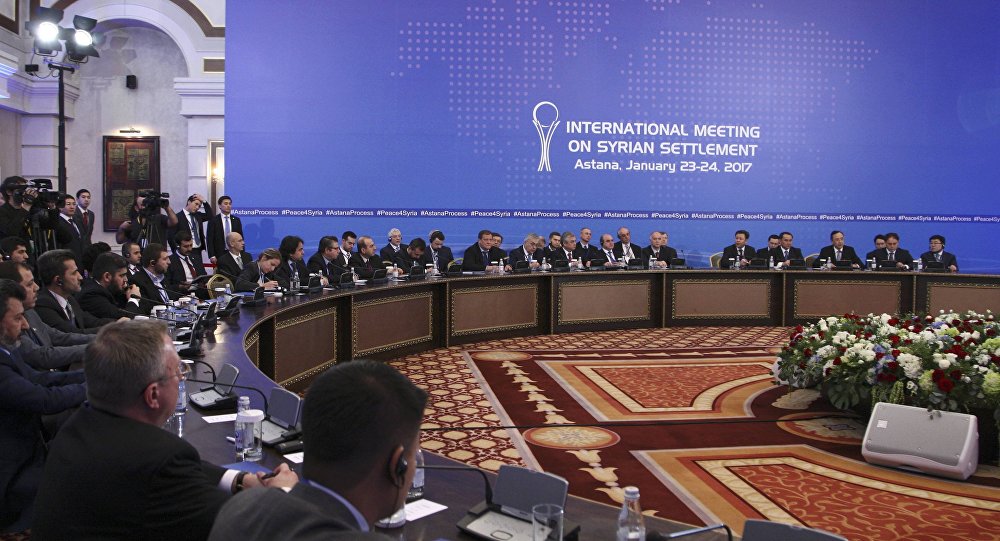(AhlulBayt News Agency) - The Syrian peace meeting in Astana, Kazakhstan, struggled to put an end to the Syrian crisis altogether, and lay the foundation of a new Syria. But the participating sides of the meeting and the countries that support the warring sides have their own conflicting opinions and pursued establishment of a new Syria in accordance with their interests. This, in turn, pushes us to cast serious doubts on any results of the negotiations that finished yesterday.
The following points to some degree can help decipher the Syrian security mystery and have a deep understanding of the Astana talks' outcomes.
1. The Astana peace conference, which is a product of Moscow meeting held by the foreign ministers of Iran, Russia, and Turkey in late December 2016, is by itself an initiative, because earlier on the one hand Turkey as an unwavering supporter of the Syrian opposition groups resisted to a peace process to which the Syrian government is a party, and on the other hand so far the political groups were the representation of the opposition in any talks, but now the armed opposition groups are sitting at the negotiating table. This means a concession, because the political groups refused to talk face to face with Damascus government but the armed groups have done that, and it was an official retreat of the opposition from once firmly-held anti-Assad stance. The previous rounds of peace talks were held in Geneva and were sponsored by the UN, however, the opposition refused to recognize the Assad-led government as a party to any future settlement.
2. It can be asserted that the Astana negotiations were an outcome of the Aleppo triumph made by the Syrian government and its allies. The Aleppo breakthrough against the terrorists has a series of resounding characteristics. The Syrian forces engaged in a fierce fight with one of the strongest terror groups on the ground, the Jabhat Fateh al-Sham (formerly al-Nusra Front) and in a two-month campaign they managed to cleanse the central and eastern parts of the city of the terrorists. This came while Turkey, Qatar, and Saudi Arabia made blatant attempts to prevent Aleppo fall into government forces. So, the armed opposition is well aware that after Aleppo defeat it has no military solutions, and so it must review its demands and concede to political process.
3. Astana hosted only 14 out of around 300 armed opposition groups, including FSA, Faylaq al-Sham, Ahrar al-Sham, Jaish Idlib, and Jabhat Al-Shamiyah. These groups altogether accounted for about 20 percent of the total percentage of the armed groups. They are trying to paint themselves as backed internally and internationally and so boost their low political and military weight in the negotiations. Their behavior in Astana talks that was based on efforts to limit the negotiations to discussing the continuation of the ceasefire and helping the encircled opposition tried to address this end. But the Moscow meeting agreement emphasized a long-term government-opposition accord. Such demands by the armed opposition came under pressures from the Jabhat Fateh al-Sham that in a statement accused the partaking militant groups of “backing down from the revolution goals” and shifting to materializing their own and their supporters' interests. The statement manifested that Aleppo liberation created a big gap among the opposition sides.
4. The Turkish modified stance on Syria and Ankara's presence in Astana meeting was of great significance. Until its thaw with Russia, Turkey insisted on removal of President Assad from power, but now it is itself encouraging the terrorist groups to join the talks, a presence that according to Jabhat Fateh al-Sham's statement means accepting indirectly– or even directly– Assad’s stay in power. Ankara did its best to convince the world that its participation in the Astana meeting was part of its initiative, not its weakness. Although Ankara still plays its role of equipping the anti-Damascus militant groups, at the same time step by step it seeks to act more disciplined and lean to political, not military, settlement for the Syrian crisis.
5. Saudi Arabia and Qatar were ostensibly not party to the political process between the Syrian government and the armed opposition but the fact was that they were involved. Qatar has firm relations with the ruling Islamist Justice and Development Party of Turkey, and it bankrolls militant groups like FSA. These links made Qatar be present at the meeting, though not in the flesh. Saudi Arabia had a similar status to Qatar in the meeting as it has supported Mohammed Alloush, the leader of Jaysh al-Islam, one of several militant groups present in peace process. Riyadh actually did not want to have a declared presence in the negotiations as it was cautious not to risk its warm relations with Jabhat Fateh al-Sham terrorist group, which was not party to the Astana event.
6. A significant issue that endangers the future of talks and their goals is West's efforts to restore the political process under its sway. In past two days, Staffan de Mistura, the UN envoy to Syria, said that Astana talks should prompt a return to the Geneva process. Such remarks, though made by UN Syria peace envoy, reflect a Western attempts to seize the results of Astana negotiations, or at least disrupt them.
But apparently the Astana peace conference is identified as an all-new initiative because it hosted new negotiators on the side of the opposition with reviewed standings. However, the Western sides, including the US and France, and even the UN, try to draw parallels between Astana conference and its Geneva version that is a failure to date.
/298
source : Alwaght
Wednesday
25 January 2017
1:36:29 PM
807174

The Syrian peace meeting in Astana, Kazakhstan, struggled to put an end to the Syrian crisis altogether, and lay the foundation of a new Syria.
